Like most Labrador retrievers, when 4-year-old Jordanna comes into a room, she is an explosion of energy, her yellow tail wagging and her wet nose sniffing anything and anyone she encounters.
But it’s not dog biscuits, cats, squeaky toys or sticks she’s after.
She’s sniffing for bedbugs.
And the demand for her services is rising as the population, and awareness, of bedbugs seems to be on the rise in the region.
Sarah Maffei, program manager and a dog handler for Readfield-based Merrills Detector Dog Services, said the company has been working with dogs for about 10 years and added bedbug detecting to its services of drug and explosives detection a few years ago. Bedbug detection has risen to account for more than 50 percent of the company’s business, with at least one call every week and often several bedbug detection jobs a week.
Including a recent job in which Jordanna confirmed the presence of bedbugs in three offices, located in the same suite, in the General Assistance offices at Augusta City Center.
City officials said they brought in the bedbug-sniffing dog because it is the most efficient way to be certain about whether a building has bedbugs within it. The city also periodically has public buildings, including Lithgow Public Library, sniffed out by bedbug detecting dogs as a preventive measure, to make sure those buildings remain bedbug-free; or, if some of the blood-sucking pests are detected, to prevent them from spreading and becoming an infestation.
AUGUSTA PROBLEMS
The business, noted Chris Voynik, business development manager, is hired only to have its dogs detects bedbugs, explosives and drugs. What to do with those things once they are identified is up to the client — though obviously, when bedbugs are found, an exterminator generally needs to be called in.
Jordanna has been called to Augusta City Center twice in recent weeks, most recently July 28, when, despite the efforts of a pest control company hired by the city to rid city offices of what officials described as a minor number of bedbugs found there, she determined bugs still are in a part of the first floor office suite where they hadn’t been detected previously.
Ralph St. Pierre, finance director and assistant city manager, said the bedbugs might have moved to that office after other parts of that office suite were sprayed with chemicals meant to kill bedbugs. He said the entire area has been sprayed again, and they’ll bring the dog back.
“We resprayed the General Assistance (office suite) and we’ll wait another two weeks, then have them come back and sniff again,” St. Pierre said. “If they’re not gone then, we’ll spray again.”
The General Assistance offices where the bugs were detected have been closed off, with those services moved to other office space in the building.
Bedbugs feed on blood and can go months without feeding. They can be difficult to find, hiding in mattresses, flooring and wallpaper, and even harder to get rid of once they’re established.
In May, a bedbug infestation was reported at two boarding houses on Water Street in Augusta, prompting the city to adopt an emergency ordinance to give city officials more power to require landlords, and tenants, to take steps to get rid of the bugs. City councilors have before them a proposal for a permanent, revised version of the emergency bedbug ordinance.
TOY REWARDS
For Jordanna, her work is play, and vice versa.
Maffei said the dogs, no matter what they are trained to detect, do so because they enjoy it. They are trained with a reward system. When they find what they’re trained to sniff out, whether it is explosives, bedbugs or drugs, they are given their toy as a reward. In the case of Jordanna and Phiona, a 3-year-old explosives-detecting black Labrador that Maffei said she is so close to “she’s like my child,” that’s a tennis ball attached to a short piece of rope, which, during a recent training session, Maffei and Phiona engaged in a brief game of tug-o-war over.
“It’s fun, happy, positive for them,” Maffei said of the dogs’ training and detection work. “You make it a game for them.”
The dogs are first trained to find their toy, hidden by a trainer. Then the toy is replaced with an item with an odor trainers want the dog to detect; and over time, the dogs learn to detect the odor, knowing that when they find it, they’ll be rewarded with their toy.
The business trains its own dogs, with seven based in Readfield, including three puppies in training, and 32 at various locations around the country.
The dogs take three to five minutes to check a room for the presence of bedbugs, or even just one bedbug, a job that would take a well-trained, highly capable person about 45 minutes.
The process is roughly the same for explosives and drug detection, though bedbug detecting dogs are trained to detect only the odor of live bedbugs, while drug and explosive detecting dogs must be able to detect a wider range of odors to find their targets.
Jordanna, Phiona and the other detector dogs sit when they find their target, and they wait for their trainer to come find the item. They don’t move until they are rewarded with their toy. Phiona, after finding some black powder Maffei had hidden inside a concrete block during recent training, kept looking from the black powder to Maffei, with an increasingly emphatic, urgent expression, until she got her reward.
HOUSEHOLD PETS
Jordanna is Merrills Detector Dog Services’ only bedbug detecting dog in Maine, but they plan to train one of their three puppies in training now, Annie, a border collie, to detect bedbugs.
Five of their Maine-based dogs are Labs. The other two, both 4 to 6 months old, are border collies.
Maffei said they use Labs because they simply like Labs, and because they are usually friendly and non-intimidating to clients.
While the dogs are friendly, clients generally are asked not to interfere with the dogs while they are working, so the dogs’ full attention will be on detecting.
Jordanna’s handler and trainer, Kendra Laliberte, said Jordanna has detected bedbugs not just in buildings, but on people, too.
“Our dogs aren’t shy about detecting on a person,” Laliberte said.
Who the business’ clients are is confidential, but, in general, bedbug clients include hotels and public buildings. Explosives detection clients include concert and sporting event venues, workplaces and schools.
When they’re not detecting scents or training, the dogs are, generally, household pets. At night the adult dogs come inside at the business, which is also attached to a home, where Maffei lives. The puppies go into their crates at night, to avoid puppy “accidents.”
The dogs have a large, grassy run in which to exercise, with obstacles for training including pallets used to help the dogs feel comfortable walking over a variety of uneven surfaces.
Maffei was trained how to train dogs by her mother, Kathy Heselton, Merrills Detector Dogs’ president.
Heselton said that before getting into the business, she worked with field trial dogs, in competitive events in which hunting dogs often find birds. She said she wanted to try something different and, working with game wardens, learned to train dogs to find human remains. She trained with multiple mentors and learned how to train dogs to detect explosives, drugs and, a few years ago, bedbugs. She said bedbug detection now accounts for 50 percent or more of the company’s work.
“It’s a really big thing right now,” she said. “The fastest way to find bedbugs is with a dog.”
Jordanna was happy to show her skills during a recent visit to the Readfield training facility. Maffei hid a vial of live bedbugs, which were obtained from a university that does research on the bugs and are kept in a safe, three times in different locations in a conference room. Jordanna took less than a minute to find each one, sitting next to the vial and awaiting her reward.
Keith Edwards — 621-5647
kedwards@centralmaine.com
Twitter: @KEdwardsKJ
Send questions/comments to the editors.


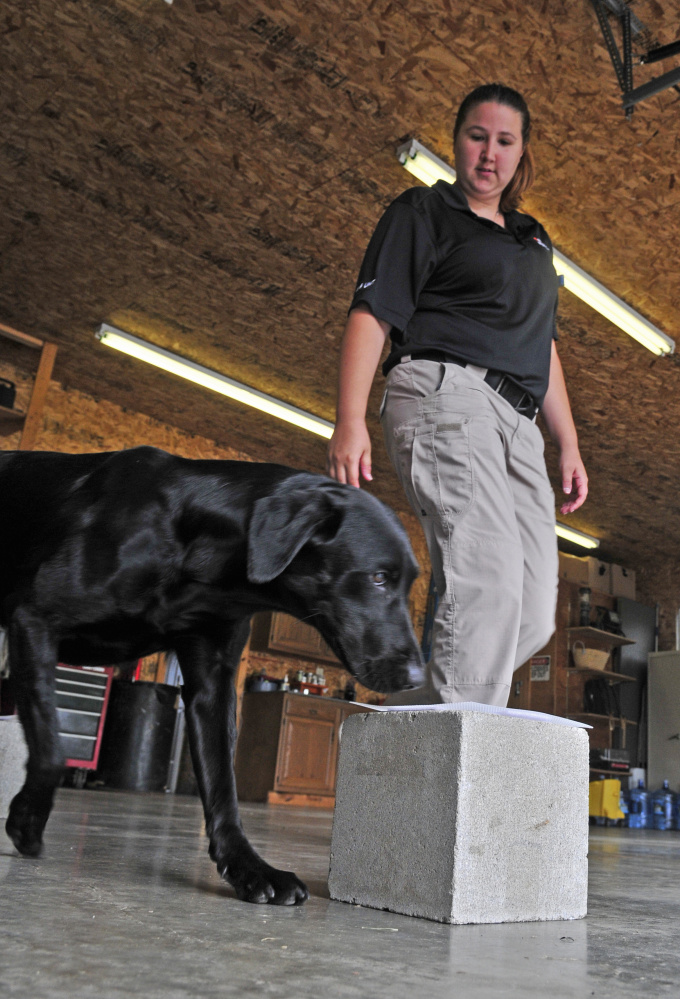
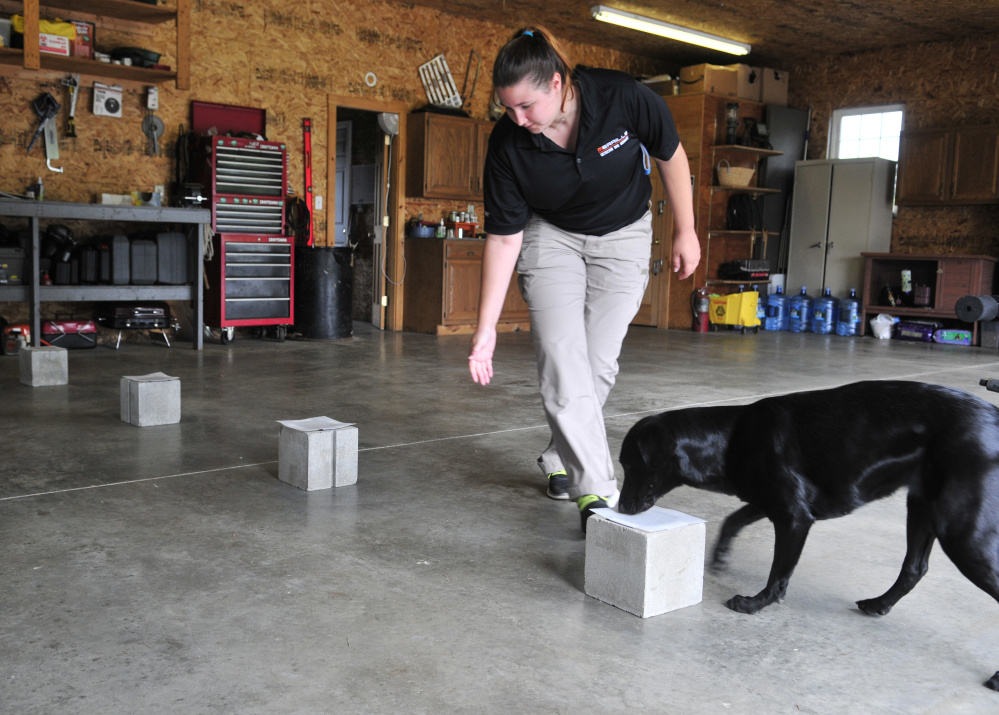
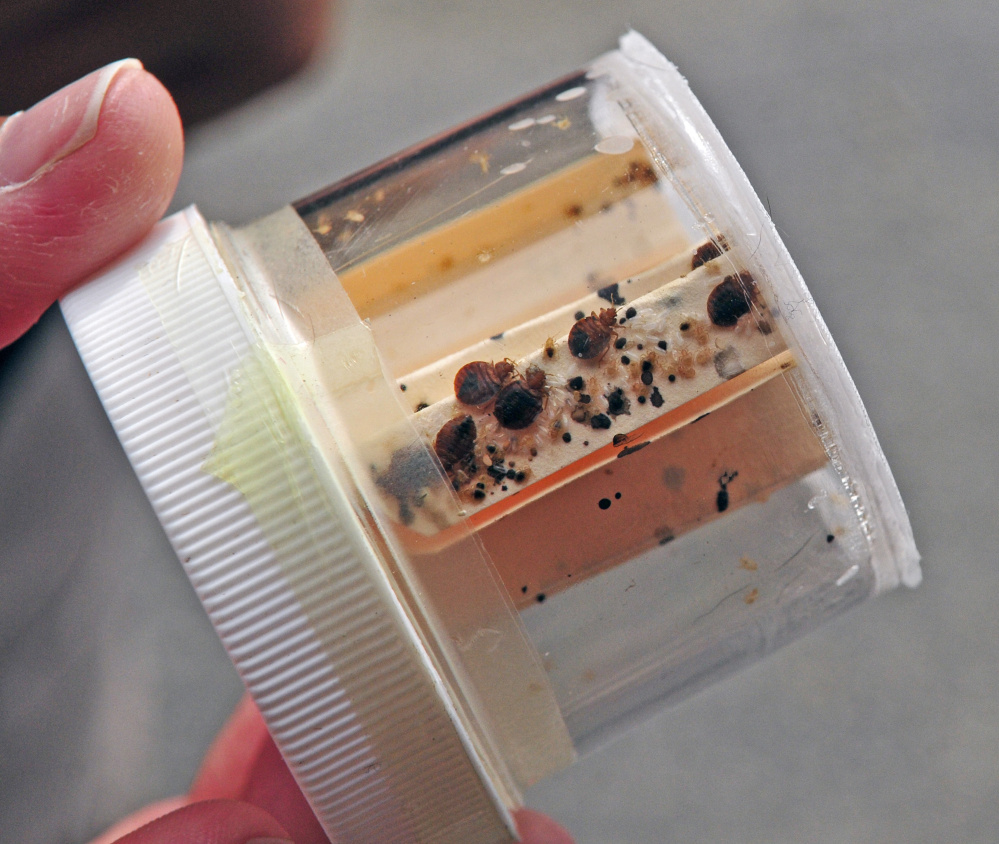
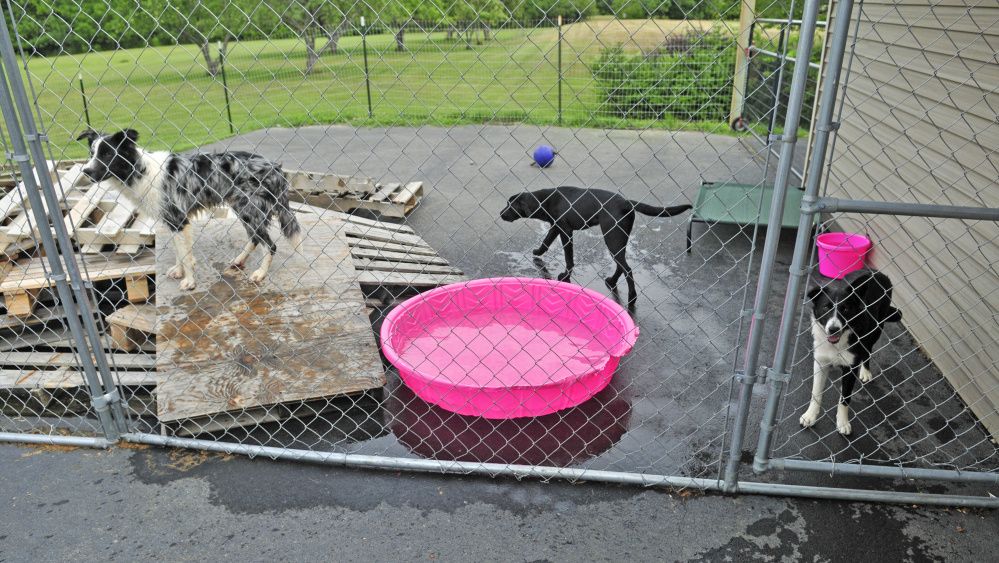
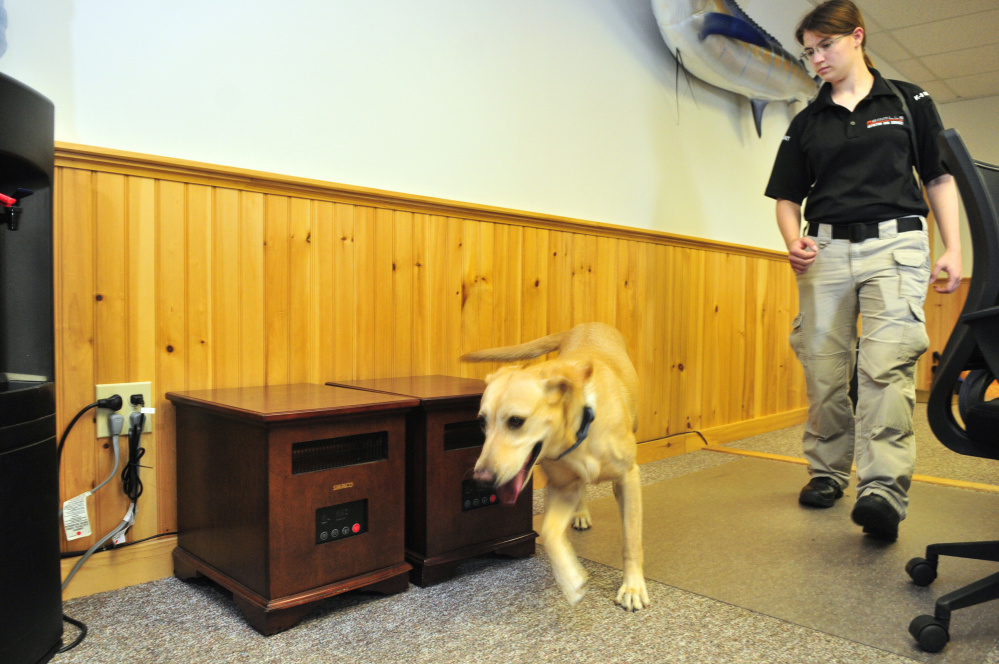
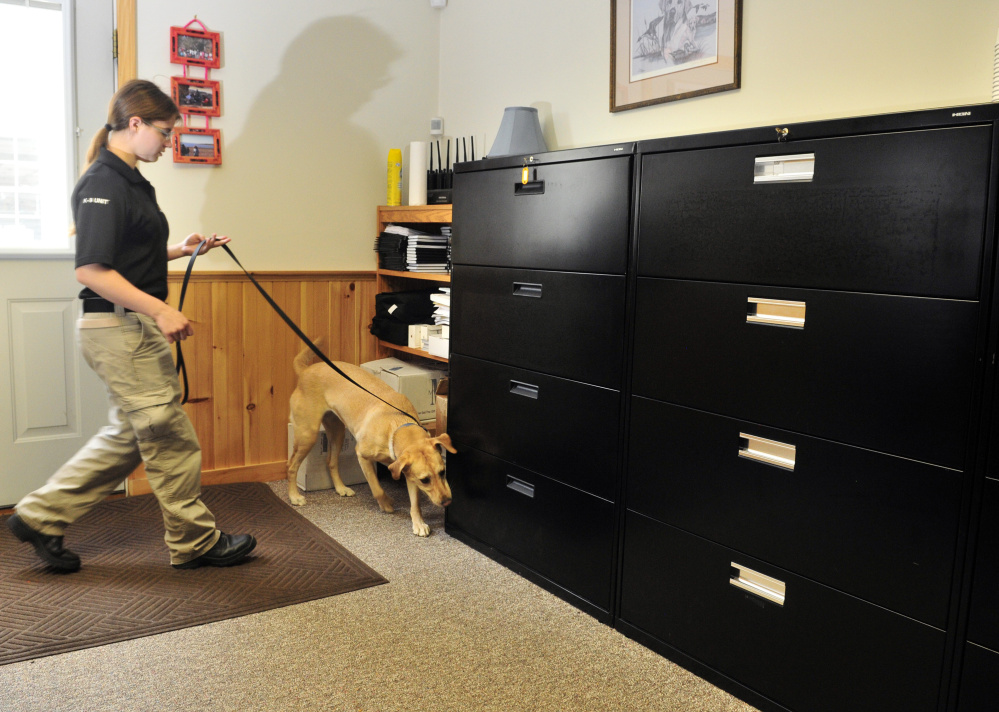
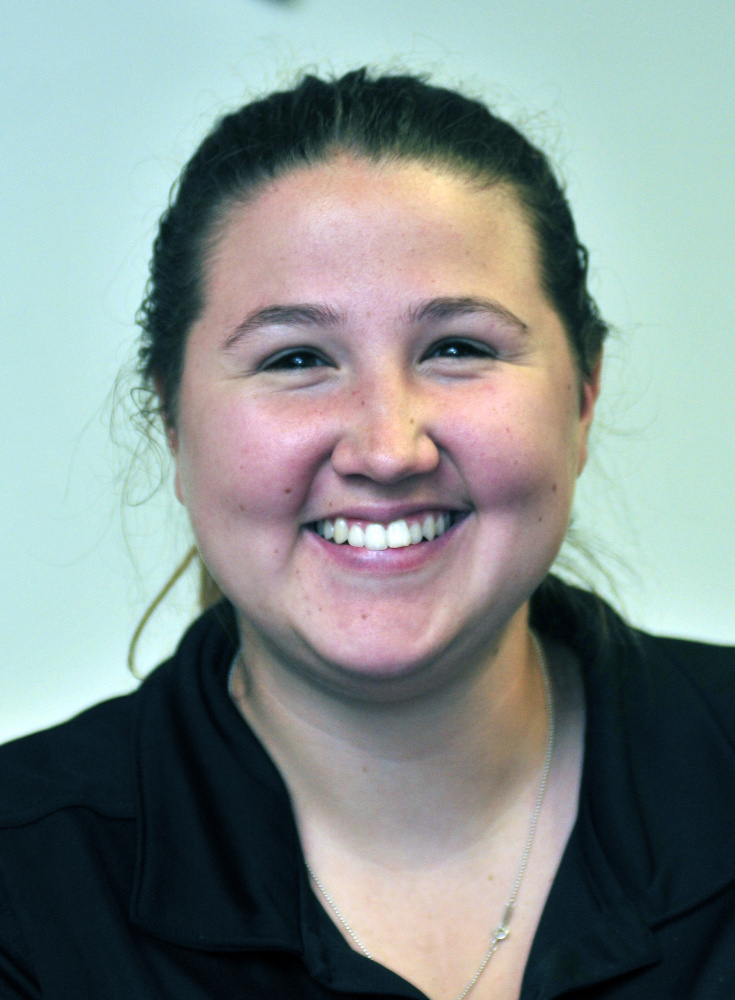
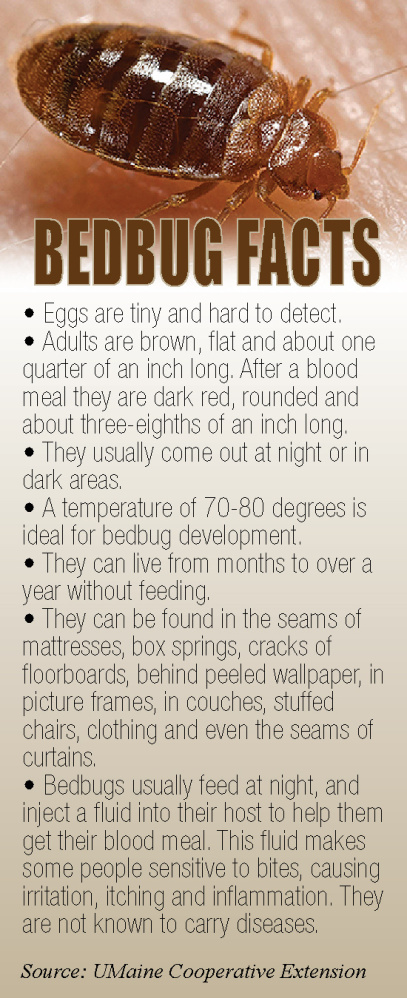

Comments are no longer available on this story